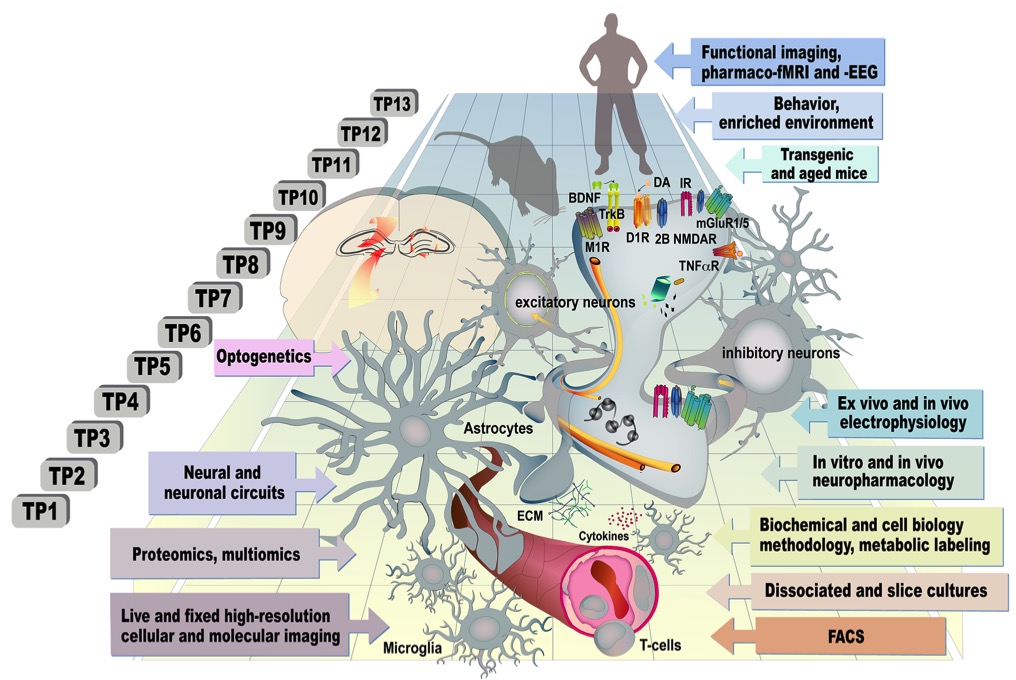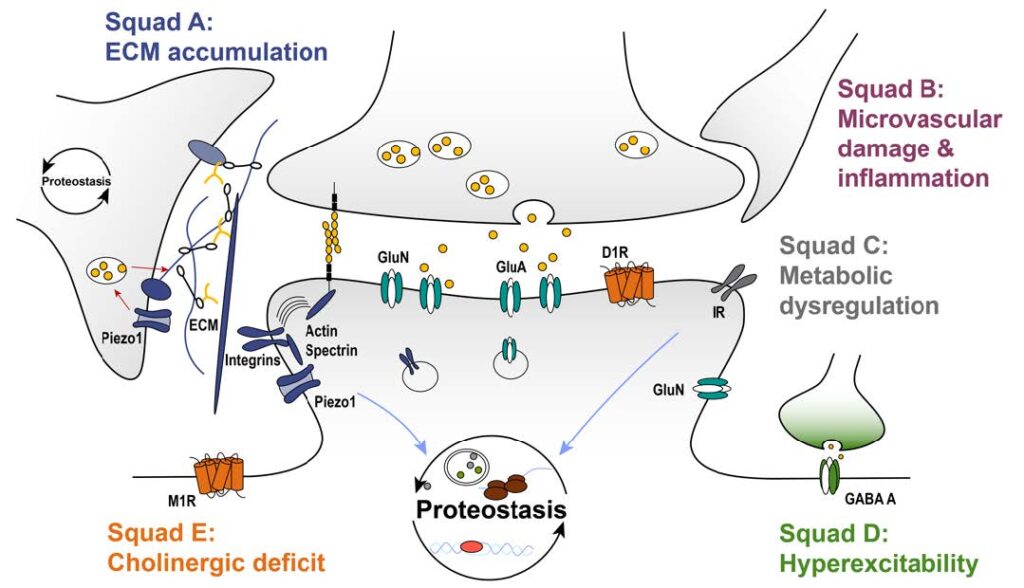RTG 2413: The Aging Synapse
Molecular, Cellular and Behavioral Underpinnings of Cognitive Decline

Age-dependent cognitive decline, characterised by symptoms of memory impairments, deterioration of executive functions, as well as emotional and social disturbance, becomes more and more immanent and affects the quality of life of many senior citizens. Although mental health problems already currently burden the European economics with 4% of their gross domestic product (OECD report 2018 “Health at a Glance: Europe”), a majority of those affected still does not receive adequate treatment. However, it has been reported that by 2050 the worldwide population of people aged 60 years or older will double (2.1 billion) and those aged 80 years or older is expected to triple between 2020 and 2050, and to reach around 426 million (WHO, October 2021). In light of these numbers, it is worrying that the development of new therapeutic strategies for ageing related cognitive decline has lagged behind the progress made in other fields of health research.
Current research in this field focuses mainly on dementia and associated neurodegenerative diseases. Much less investigated and in many aspects neglected, however, are the consequences of normal aging as such for synaptic, cellular and neuronal network properties. Normal aging is associated with a decline in sensory, motor, and cognitive function, in particular working memory, cognitive flexibility and multi-tasking capacity, and although relatively mild as compared to dementia, this negatively impacts on health and life quality. In fact, there is cumulating evidence that not only genetic factors contribute to the course of aging but also individual lifestyle habits such as rich diet, little to no exercise, stress, provoked development of the metabolic syndrome, vascular alterations, all of which negatively impact on cognitive function in the elderly as well.
The innovative research program RTG2413 SynAGE deals with the idea that cognitive decline in normal aging results from subtle synaptic alterations that impart an imbalance between stability and plastic properties of spine synapses and that is qualitatively different from neurodegeneration. This will further involve changes in the properties and functionality of the extracellular matrix, communication and interaction with glia cells and cells of the immune system, neuromodulation, and ultimately otherwise compensatory mechanisms. We aim to understand these processes of synaptic aging from a molecular, cellular as well as behavioral angle by jointly addressing transversal, intimately linked themes forming a comprehensive framework for inspiring thesis projects for 14 PhD and 14 MD students with high societal relevance.

Five key aging related synaptic changes are addressed in our Squads.
We concentrate in SynAGE on the following key aging related synaptic changes:
- increase of cellular rigidity in the brain (Squad A: Dieterich Lab, Dityatev Lab, Seidenbecher Lab, Stork Lab),
- effects of hypertension and changes in microvasculature (Squad B: Dityatev Lab, Schreiber Lab),
- a blunted metabolic response as evidenced in synaptic insulin resistance (Squad C: Düzel Lab, Kreutz Lab, Remy Lab, Seidenbecher Lab),
- hippocampal circuit hyperexcitability (Squad D: Pakan Lab, Maass Lab, Remy Lab) and
- disturbance of cholinergic modulation (Squad E: Kreutz Lab, Stork Lab, Ullsperger Lab)
SynAGE addresses these five transversal themes in a joint effort by a team of molecular/cellular and systems neurobiologists to eventually break ground for innovative intervention strategies.
We employ cutting-edge technologies and emergent techniques, promote international visibility at an early stage and chances for intensive networking to promote career track development in- and outside of academia. Enhancing the career perspectives and employability of researchers and contribution to their skills development is a core principle of our structured and individualized supervision and training PhD program. To identify individual needs and, hence, implement measures accordingly, the students will assess themselves with the help of ‘Individual Development Plan’ (IDP) forms each year. These IDP forms shall be shared with the supervisor ahead of the annual thesis committee meetings and used to clarify approaches to the student/mentor relationship. From the very biginning of their studies PhD and MD students are educated on the code of conduct „Guidelines for safeguarding good research practice“ issued by the DFG.
Collaborations within the CBBS (Center for Behavioral Brain Sciences) and the local GC-I3 (Health Campus: Immunology, Infectiology and Inflammation) and CDS (Dynamic Systems and Biosystems Engineering) as well as with international groups offer a competitive and instructive environment. Locally, our RTG2413 is embedded in the Otto von Guericke Graduate Academy (OVG-GA) and the CBBS Graduate Program, both ensuring high quality standards for education of graduate students serving as central service unit for all doctoral students of the entire OvGU.
